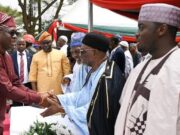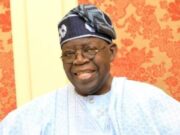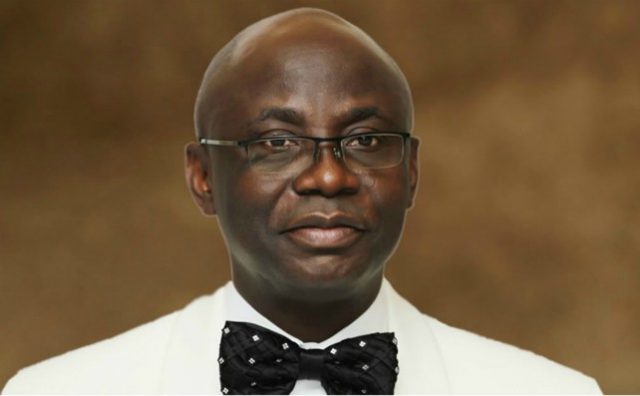Two anecdotes have been used to justify the controversial pulpit tirades of senior pastor of Citadel Global Community Church in Lagos, Tunde Bakare, whose video went viral last week. One is that famous Obinde proverb, popularized by former governor of Lagos and Osun States, Olagunsoye Oyinlola. Second is one I stumbled into during the past week, a rationalization of ancient Yoruba treatment of their warriors and the morality of their warfare.
Bakare had shot artillery fires at opponents of All Progressives Congress (APC) leader, Bola Ahmed Tinubu. The anecdotes, spun and spearheaded by some leading Yoruba, also crucified my own piece of last week entitled Tinubu, run! Please, run! and likened it to the anticlimax of the proverbial man who used the blade of his cap to decapitate an elephant.
“I have a word for some Yoruba people whose stock in trade is nothing but a rancorous noise characterized by bitterness and resentment about the ancestry of the former two-term governor of Lagos state, Asiwaju Bola Ahmed Tinubu. Carry your stone… those Yoruba rancorous elements, noisemakers who have not achieved much as Asiwaju Tinubu has achieved, but are always querying and worrying themselves about his ancestry,” Bakare had said.
In 2014, at the grand finale of the second term campaign programme for Rauf Aregbesola, his predecessor as Osun governor, Oyinlola had regaled the campaign audience with the Obinde. I was there. While submitting that the Peoples Democratic Party (PDP) at the centre had been unfair to Yorubaland, Oyinlola likened the injustice and unfairness to the maltreatment of Obinde, an unfortunate widow. He called it iyanje Obinde (the cheating of Obinde).
Obinde was a quintessential Yoruba housewife in matters of fate and endurance. She saw in their very raw forms, ‘the fiery flames of fire and the searing glare of the sun.’ She suffered immensely in the home of her husband through multiple child-bearing and slaving to take care of her children. When her husband took ill, she was again the one who ran helter-skelter to procure a cure for what ailed him. Then the man eventually died and that was when her suffering got elevated. The husband’s extended family needed funds to bury him. They went out to borrow money and what was the collateral? The bereaved woman herself. Obinde was pawned in a system called Iwofa. The Iwofa institution in Africa, a system of pawnship which thrived from 17th to 18th century, was such a cruel arrangement which secured individuals as collaterals for debts incurred by others, most usually their relatives and acquaintances. Such pawned individual worked in the house or commercial venture of the money lender, in exchange for loaned money. Their release is only secured when the money is paid. It was this grueling system that Obinde was made to face, after serial sufferings in the home of her husband. Those sneaking this story into the 2023 political narrative are saying, if a longsuffering someone is denied the presidential seat, it would mean he has laboured in vain for the Yoruba people.
The second anecdote used to justify Pastor Bakare’s tirade was a hypothetical conjecturing of the disposition and psychology of war in Yorubaland. When Yoruba go to war, do they moralize or put morality in abeyance? When they return from such wars, how do they treat their warriors? What then is the place of their highly burnished moral code if adversity and peace sway how they moralize? The anecdote claims that Yoruba don’t moralize the past of their warriors and it is in tandem with Bakare’s claims in Tinubu’s defence.
The man who told me the story, an older friend of mine, is an ally of a foremost Yoruba civil war hero and retired General whose name I do not have the permission to reproduce here. The General, he said, authored this psychology of war narrative. Let me begin from its summation, its kernel being that, Yoruba do not despise their heroes, no matter their pre-heroism baggage, even if such heroes hitherto waddled in the sewage with the swine. This particular hypothetical story situated a war situation and how Yoruba fought such in traditional Africa.
The atmospheric that birthed the story goes thus: The older friend of mine and the retired General, at the thick of the guerilla war by the National Democratic Coalition (NADECO) against General Sani Abacha, lived in the United States of America. My friend had, one bright morning, walked up to the General and challenged him. “General, I have known you all these years for your uprightness, righteousness and as a strong stickler for excellence,” he began. Why then did the General become obsessed with Bola Ahmed Tinubu who, he alleged to the General, was perceived to be the converse of all that the war hero stood for?
Like an old man telling a moonlight tale of prowess and conquest to impressionable children, the General reportedly began the war hypothesis, the narrative of which I paraphrase in my own words here: “Let us imagine a situation of turmoil in traditional Yoruba society. Wailing and crying oozing from suckling mothers and children in their diapers; the town in turmoil, running from pillar to post. All townspeople then rush to the palace of their king, shouting that the town had been besieged by murderous enemies. The king frantically sends for the town’s warriors and their leading Generalissimo. He is however shocked when told that they had all bolted out of town. Nobody is prepared to face the rampaging and advancing enemies. All of a sudden, a young rascal, despised by the generality of the people for his waywardness, comes forward and tells the king that he is capable of stopping the advancing army. Looked down upon and perceived with odium by the people of the town, the king reluctantly gives the rascal the go-ahead to rescue the people from the blood-sucking enemies. If, at the end of hostilities, that rascal wins the war and comes back home with the head of the enemies, in Yorubaland, such rascal is a hero and Yoruba would clothe him, in spite of his nakedness,” the General reportedly told his guest.
The third narrative I encountered in the last one week is that it would be amoral, wicked and incongruent for a dog to kill a snake that threatens to kill a people, only for that selfsame dog to be driven away from sharing in the meat on allegation that its saliva is irritating.
These three narratives were spun by people around me, in defence of Senator Tinubu to justify Pastor Bakare’s denunciation of his enemies who continue to harangue him because of, in Bakare’s words, “Tinubu’s ancestry and rough beginning.”
In that pulpit fury, Bakare escalated what had hitherto been hushed up in whispers in Nigeria about Tinubu. The preacher, while delivering the homily to his congregants, plunged headlong into the dirty, murky waters of politics. He likened Tinubu to the biblical Jephthah, so as to adumbrate the thesis that, the fact of his birth notwithstanding, Tinubu rose to power. Why Bakare alluded to Biblical Jephthah is unclear, or rather, intriguing, because the most renowned bit about this biblical character was that he was a judge and warrior who, on going to a war, pledged that if he won, whoever met him upon returning home would be sacrificed to God. His daughter ran out to meet him and Jephthah sacrificed her. So, is Tinubu really a Jephthah who had pledged or would pledge and sacrifice anyone around him to get whatever he wanted – like Oluronbi in folklore who pledged her only son to the gods of the village?
“Like Jephthah the Gileadite, he (Tinubu) has fought many battles on behalf of the Yoruba people and won despite his rough beginning and God does not need anybody’s permission to put such in his hall of fame despite their past deeds and ancestry…Despite his growing up challenges, the dents and the detours of his life, he like Jephthah delivered Lagos State and nearly all the southwest states from the onslaught of the PDP from 1999 to 2007,” Bakare said.
The most fitting comparison of Bakare’s Tinubu analogy is that anecdote from the Yoruba retired General about how Yoruba rate their Generalissimo, especially why, in spite of the cruel and condemnable offering of his daughter as sacrifice, Jephthah still remained a hero among the Gileadites for his valour and coming to the rescue of his people.
Bakare has come under huge flaks for the above statements. What was worrisome to people was that the voluble pastor had attacked Tinubu a short while ago. In a vitriolic sermon, he had charged at Tinubu thus: “That’s why potholes are killing you… you can’t drive now anymore because what is meant for road has been stolen since democracy began, they are living larger than life, having jets here, having jets there, having house in Bourdillon… You will not go without vomiting what you have stolen…” he had said, among other things.
Both the Yoruba war narrative and the travails of Obinde seek to state that, when Tinubu was in the struggle to rescue Yoruba people from the manacles of Abacha, where were the moralists who now see him as belonging to the sewage? When he sold his property abroad to finance NADECO, where were we? Those pushing this line have not told us if it is also right and acceptable for a warrior to come back from battle and then plunder his villagers’ straws to roof his private residence?
I disagree with both the Yoruba General and Pastor Bakare. First, in all Yoruba literature I have read and serial bonding with elders from whom I mopped up the mores, lore and culture of the Yoruba people, I am not sure I ever came out with any indication that Yoruba relegate morality to second fiddle in any consideration. Especially when it comes to their leadership. Yoruba are a very proud, self-respecting and moralistic people who value name and honour above valour. Yes, they keep rascally children for hot days of attack from outside infiltrators but they don’t present such children when it comes to the question of who leads them. In those moments, they filter for purity, they comb for quality and honour. They look for morals and use uncompromised scanners to pick leadership candidates. The facts of Tinubu’s intervention for the Yoruba people during the NADECO war against military despots are well noted and documented. He, alongside other greats’ exploits, can never be over-emphasized and will forever be in the annals of our history. The facts of his governorship of Lagos are also documented, especially how many leaders have been hatched from his incubator. But there is also the question, what manner of leaders are some of those birthed by his machine? He has his pluses, but his unexplained past and even the present are there too as listed by Bakare.
Our case is like that of an airplane passenger. He assumes he is not being flown by a pilot with a tainted flying history. It is one of the reasons why Tinubu should not be the candidate of the Yoruba.
- Popular columnist and Lawyer, Dr Festus Adedayo sent this in from Ibadan, the capital city of Oyo State











































































